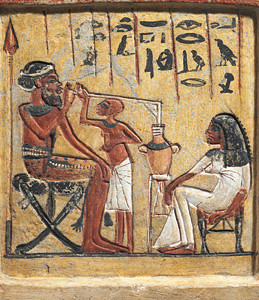![]()
Biblical Archeology Review has an interesting article in their September/October issue entitled Did the Ancient Israelites Drink Beer?. The author makes some of the same points I’ve often made — but with more authority — that because of mistranslations and bias, beer is mostly absent from the Bible despite the fact that it’s everywhere else in mankind’s early history. The article’s takeaway is a resounding yes, they did drink beer, and lots of it. Not surprising, but great to see that fact getting more scholarly attention.


Hmm. For me I think they do drink beer. Just to keep their body temperature hot to prevent them from cold and also it is part of their celebration.
Of course they did. In present day, clean water is often times difficult to come by outside of the first world society. When travelling to third world countries, you are instructed “not to drink the water.” Unless it is bottled, that water is either seawater or freshwater that is infected with bacteria such as e-coli and typhoid. Beer, on the other hand, has alcohol, an antiseptic. Beer is much safer to drink and contains many nutrients and minerals that are essential to the body.
Beer (as of the Reinheitsgebot law of 1516 of Bavaria) is defined as a substance made from barley, hops, and water. The final component is yeast, the living microorganism that eats sugars and expels ETOH alcohol and Carbon dioxide.
There is evidence to suggest that ancient Israelites had knowledge of yeast because they made unleaven bread, (a bread that does not expand for fault of yeast). That means that they must have known how to make bread leaven, or rise.
According to Michael Jackson, (referring to the Beer expert, not the infamous international music sensation) King David was himself a beer brewer. The Star of David is a Six-pronged star which has many references to brewing and alchemy. In retrospect, this makes sense because for many centuries, alchemists sought to change metals into gold. Brewers intend instead to make bread (cereals, primarily barley) into the liquid gold we call beer.
Hops is both a bittering/flavoring agent and preservative in beer. The more Hops a beer recipe calls for typically yields a more bitter beer. In present day, we know that Hops has many benefits to our health which makes the following a very curious assumption. In 1886, Bickerdyke, in “The Curiosities of Ale and Beer,” wrote about a theory regarding why during times of Babylonian Captivity, the Jews steered free from contracting leprosy by drinking bitter beer (made with hops). Granted, the Babylonian Captivity was over 500 years after Jesus and much after the Old Testament was derived. However, it does hint that beer in the Jewish culture has a long history.
Beer has been made for thousands of years, starting with the Chinese, the Egyptians, Mesopotamians, etc. and many civilizations have used the 2-row cereal barley to make beer. Barley grows almost virtually anywhere and when it sprouts, it frees up the sugars maintained by the husks. Added to water, it’s only a matter of time before airborne alcohol resistant yeast lands on the barleywater and converts the starches to ETOH alcohol. It is quite evident that since these societies have been brewing for thousands of years, they must have influenced the ancient Israelites.
For more information, I suggest reading “A history of beer and brewing”
By Ian Spencer Hornsey and “The World Guide to Beer” BY Michael Jackson.
MAY THE HOPS BE WITH YOU